Category Archive 'J.R.R. Tolkien'
28 Jun 2014

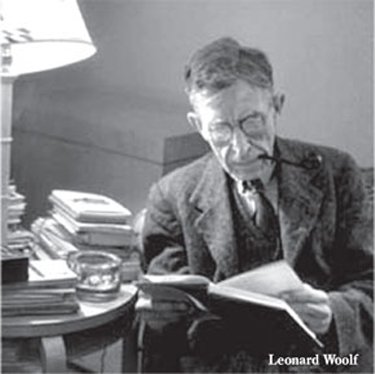
In his 2010 essay, “The Death of a Civil Servant,” fantasy novelist Lev Grossman finds the collision between Modernism and the Revulsion Against Modernism Expressed as Fantasy exemplified in the 1905 colonial experiences of Bloomsbury’s Leonard Woolf.
All Englishmen who were in their twenties in 1905 had at least one thing in common: They’d watched the world of their childhoods die. Just as they were coming of age, electricity replaced gaslight. Cars and buses replaced horses and bicycles. Urban populations were exploding, mass media and advertising were yammering, and mechanized warfare crouched in the wings, ready and waiting. The early twentieth century looked and sounded and smelled nothing like the late nineteenth. “In those days of the eighties and nineties of the nineteenth century the rhythm of London traffic which one listened to as one fell asleep in one’s nursery was the rhythm of horses’ hooves clopclopping down London streets in broughams, hansom cabs, and four-wheelers,†Woolf would write, toward the end of his life, in the unimaginable year of 1960. “And the rhythm, the tempo got into one’s blood and one’s brain, so that in a sense I have never become entirely reconciled in London to the rhythm and tempo of the whizzing and rushing cars.†Woolf felt displaced, like the hero of H. G. Wells’s The Time Machine, exiled in the future. So did everybody else—Evelyn Waugh once remarked that if he ever got ahold of a time machine, he’d put it in reverse and go backward, into the past.
It’s no accident that both modernism and modern fantasy made their entrances at that moment, in that same displaced generation. It’s rarely remarked upon, but just as Virginia Woolf and Joyce and Hemingway were inventing the modernist novel, Hope Mirrlees and Lord Dunsany and Eric Rücker Eddison were writing the first modern fantasy novels, at least in the form most fans are familiar with. This happened for a reason. Modernism and fantasy were two very different responses to the same disaster: the arrival of the modern era and the death of Woolf’s beloved nursery-world. Though like siblings—or roommates—who are mortally embarrassed by each other, they’re not in the habit of acknowledging the connection. …
But fantasy and modernism aren’t just opposites, they’re mirror images of each other. When the social, cultural, and technological catastrophe that inaugurated the twentieth century took place, leaving the neat, coherent Victorian universe a desecrated ruin, all that was left for writers to do was to sift disconsolately through the rubble and dream of the organic, vital world that had once been. Modernism was pieced together out of the jagged shards of that shattered world—it’s a literature made of fragments, the better to resemble the carnage it represented. Whereas fantasy was a vision of that lost, longed-for world itself, a dream of a medieval England that never was: green, whole, prelapsarian, magical.
Here and there you can spot their shared heritage, the places where modernism and fantasy touch. Modernists and fantasists both rework myths and legends: you can watch King Arthur and his knights trot, obscured but still visible, through Eliot’s “The Waste Land,†Virginia Woolf’s The Waves (in the person of the knightly Percival), and Joyce’s Finnegans Wake (“Arser of the Rum Tippleâ€) to emerge into the sunlit meadows of T. H. White’s The Once and Future King. Modernism and fantasy are set against the same landscapes: verdant preindustrial hills and dark, broken ruins. La tour abolie of “The Waste Land†is the architectural double of Orthanc, the tower of Saruman the White in The Lord of the Rings. The green fields of Narnia abut the “fresh green breast of the new world†that Fitzgerald invokes at the end of The Great Gatsby.
But by the time we reach them, those green fields are always in decline. The spell never lasts. King Arthur is always dying, and the Elves are always shuffling off toward Valinor, where mortals cannot follow. Narnia falls into chaos, then drowns and freezes, and the survivors retreat into Aslan’s Land. We think of fantasy and modernism as worlds apart, but somehow they always end up in the same place. They are perfectly symmetrical. Fantasy is a prelude to the apocalypse. Modernism is the epilogue.
Read the whole thing.
Via Ratak Monodosico.
04 May 2014
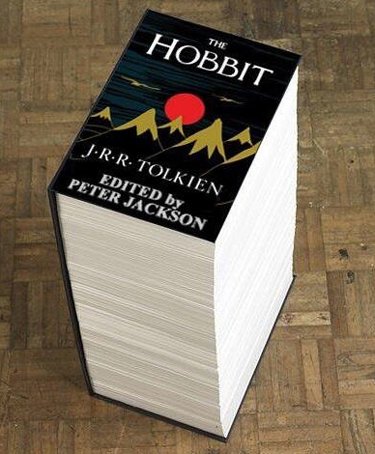
Hat tip to Karen L. Myers.
02 Apr 2014

Unknown, Sir Walter Raleigh, 1593, University of North Carolina.
[In the Fall of 1944, at the Bird & Bush, C.S. Lewis told J.R.R. Tolkien and the other Inklings about an elderly lady he knew]:
“She was a student of English in the past days of Sir Walter Raleigh. At her viva she was asked: What period would you have liked to live in Miss B? In the 15C. said she. Oh come, Miss B., wouldn’t you have liked to meet the Lake poets? No, sir, I prefer the society of gentlemen. Collapse of viva.”
–Letter from J.R.R. Tolkien to his son Christopher Tolkien, 6 October 1944, The Letters of J.R.R. Tolkien, p. 95.
21 Mar 2014

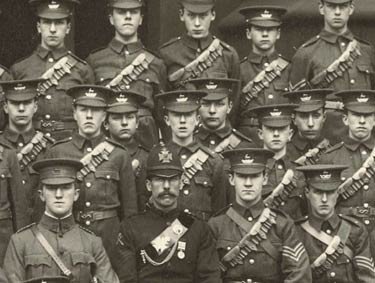
The King Edward School (Birmingham) Cadet Corps in 1907. The 15-Year-Old J.R.R. Tolkien (mouth open) is fourth from the left in the middle row.
—————————–

—————————–
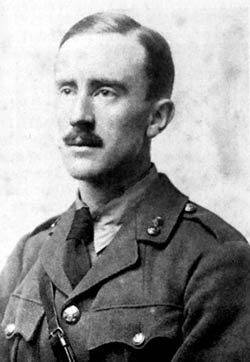
24-Year-Old Second Lieutenant J.R.R. Tolkien, Lancashire Fusiliers, 1916.
A school photo of the schoolboy J.R.R. Tolkien in Cadet Corps uniform recently made the British papers after being unearthed from the archives of his old school in Birmingham.
The Kind Edward School Cadet Corps had just been founded in march of 1907, and had the honor of being inspected by Lord Roberts of Kandahar in April.
Not many years later, most of these boys would find themselves as junior officers with the life expectancy of a mayfly on the Western Front. Tolkien participated in the Battle of the Somme, specifically in the assaults on the Schwaben Redoudt and the Leipzig salient, but happily survived, when so many others did not, because he was incapacitated by trench fever. He spent the rest of the war alternating between hospitals and garrison duty, having been found medically unfit for further front-line service.
Via John Garth.
08 May 2013
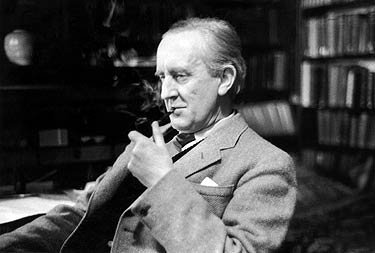
Tolkien wrote Philomythus to Misomythus as a rejoinder to one [C.S. Lewis] who said that myths were lies and therefore worthless, even though ‘breathed through silver’.
I will not walk with your progressive apes,
erect and sapient. Before them gapes
the dark abyss to which their progress tends
if by God’s mercy progress ever ends,
and does not ceaselessly revolve the same
unfruitful course with changing of a name.
Read the whole thing.
Hat tip to Vanderleun.
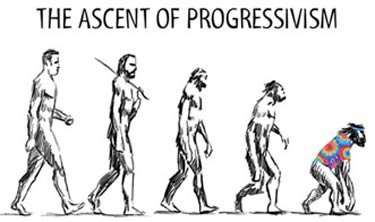
03 Apr 2013

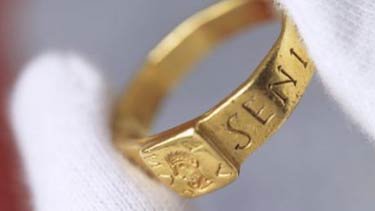
A Roman ring, found in a farmer’s field (presumably part of what was once the Roman town Calleva Atrebatum) near Silchester, Hampshire in 1785 in some unknown manner wound up preserved in the library of The Vyne, a stately 16th century home belonging (until 1958, damn Socialism!) to the Chute family.
The ring bears an image of Venus and a Latin inscription. That inscription apparently connects the ring to a Latin curse tablet found by Sir Mortimer Wheeler in an excavation of a temple complex associate with the god Nodens at Lydney Park in Gloucestershire.
The lead curse tablet read:
DEVO NODENTI SILVIANVS ANILVM PERDEDIT DEMEDIAM PARTEM DONAVIT NODENTI INTER QVIBVS NOMEN SENICIANI NOLLIS PETMITTAS SANITATEM DONEC PERFERA VSQVE TEMPLVM DENTIS
For the god Nodens. Silvianus has lost a ring and has donated one-half [its worth] to Nodens. Among those named Senicianus permit no good-health until it is returned to the temple of Nodens.
Sir Mortimer Wheeler in 1929 apparently consulted with J.R.R. Tolkien at Oxford about the natural hypothesis that the Silchester ring, with the inscription “SENI???”, might be the very same ring Silvianus had lost.
Tolkien took an interest in the matter, visited the Gloucestershire temple complex several times, and made a point of looking into the etymology of the name of the god Nodens.
It is believed today that it was this real world story of a lost, and very improbably rediscovered, gold ring, bearing an inscription, and weighted with a curse that may very well have been the inspiration of the One Ring featured in The Hobbit which appeared in 1937.
In any event, the Silchester ring is now being put on display by the combined efforts of the Tolkien Society and the National Trust in a newly-established “Ring Room” in The Vyne.
BBC story
The Register
National Trust page
03 Mar 2011


Spanish edition: The Last Ringbearer — Discover the Other Side of the Legend
History is written by the winners, we all know. A mischievous Russian biologist and Tolkien fan named Kyrill Eskov decided to attempt to imagine the history of the concluding years of Third Age of Middle Earth from the perspective of the losing side.
As far back as 1999, he published a nearly 300-page alternative-to-the-Lord-of-the-Rings-version, titled The Last Ringbearer. The Eskov Ring was subsequently published in a number of other major European languages, but the closely-allied-to-the-Valar Tolkien estate idealistically has absolutely blocked its publication in English.
Finally, Yisroel Markov, a Manager of Investment Reporting at Massachusetts Pension Reserves Investment Management, completed his own English translation (batted out over “a few dozen lunch hours”). He ran his translation past the author for correction and approval, and then made it non-commercially available on-line last December.
Laura Miller reviewed it in Salon.
Eskov treats the Tolkien version of Middle Earth history as pious myth and propaganda. The real conflict, in his version, was between the anti-technological Gandalf using barbarous and brigandish men as his cats’ paws against the rational and scientific civilization of Mordor.
Mordor, as you see, is much more favorably portrayed:
Barad-Dur rose six centuries ago, that amazing city of alchemists and poets, mechanics and astronomers, philosophers and physicians, the heart of the only civilization in Middle Earth to bet on rational knowledge and bravely pitch its barely adolescent technology against ancient magic. The shining tower of the Barad-Dur citadel rose over the plains of Mordor almost as high as Orodruin like a monument to Man – free Man who had politely but firmly declined the guardianship of the Dwellers on High and started living by his own reason. It was a challenge to the bone-headed aggressive West, which was still picking lice in its log ‘castles’ to the monotonous chanting of scalds extolling the wonders of never-existing Númenor. It was a challenge to the East, buckling under the load of its own wisdom, where Ying and Yang have long ago consumed each other, producing only the refined static beauty of the Thirteen Stones Garden. And it was a challenge to a certain someone else, for the ironic intellectuals of the Mordor Academy, unbeknownst to them, have come right up to the line beyond which the growth of their power promised to become both irreversible and uncontrollable.
And Gandalf and Saruman are also a bit different.
Arnor, the Tower of Amon Súl
November, year 3010 of the Third Age
“A state that is unable to feed itself and is dependent on food imports cannot be considered a formidable foe.â€
Those words were uttered by a tall white-bearded old man in a silvery-gray cloak with its hood thrown back; he stood with his fingertips resting on the surface of a black oval table, surrounded by four people in high-backed armchairs, half in shadow. By some signs, his speech had been a success and the Council was on his side, so now the piercing dark blue eyes of the standing man, which contrasted starkly with the parchment-yellow skin of his face, were focused on only one of the four – the one he would have to battle now. That man, huddling tightly in his blinding-white cloak, sat at a slight distance, as if already separating himself from the rest of the Council; he appeared to have a strong fever. Presently he straightened out, clutching the chair arms, and his deep and smooth voice sounded under the dark ceiling:
“Have you any pity on them?â€
“On whom?â€
“On the people, Gandalf, the people! As I understand it, you have just sentenced the civilization of Mordor to death, in the name of the higher good. But any civilization consists of people, so they would have to be exterminated, completely, with no chance of recovery. Right?â€
“Pity is a poor adviser, Saruman. Haven’t you looked in the Mirror with the rest of us?â€
Gandalf pointed to the large object in the middle of the table, which looked most like a huge bowl full of quicksilver. “There are many roads to the future, but whichever of them Mordor takes, no later than three centuries hence it will access the forces of Nature that no one will be able to harness. Would you like to once again watch them turn the entire Middle Earth and Far West into ashes, in a blink of an eye?â€
“You are correct, Gandalf, and it would be dishonest to deny such a possibility. But then you should exterminate the Dwarves, too: they have already wakened the Terror of the Deep once, and it took all our magic to prevent it from escaping. You know that those bearded tightwads are mulishly stubborn and not inclined to learn from their mistakes…â€
“All right, let us not speak of what is possible, and speak only of the inevitable. If you do not wish to look into the Mirror, look at the smoke rising from their coal furnaces and copper refineries. Walk the salt pans into which they have turned the lands west of Núrnen and try to find one living plant on those half-a-thousand square miles. But make sure not to do it on a windy day, when salty dust rises like a wall over the plain of Mordor, choking everything in its path… And note that they have done all that barely out of the crib; what do you think they will do later?â€
“Gandalf, a child is always a disaster in the house. First dirty diapers, then broken toys; later, the family clock taken apart; to say nothing of what happens when he grows up a bit. A house without children, on the other hand, is a model of cleanliness and order, yet somehow its owners are usually not too happy about that, especially as they age.â€
“Saruman, always have I been amazed by your cunning ability to turn another’s words inside out, and disprove obvious truths via sly casuistry. But by the Halls of Valinor! it will not work now. The Middle Earth population is now a multitude of peoples living in harmony with nature and the heritage of their ancestors. These people and their entire way of life are now under a dire threat, and my duty is to avert it at all costs. A wolf plundering my sheep has its own reasons for doing so, but I have no intent of figuring them out!â€
“I am, by the way, no less concerned with the fate of the Gondorians and the Rohirrim than you are; but I look further into the future. Do you, a member of the White Council, not know that the totality of magical knowledge by its very nature can not grow beyond what was once received from Aulë and Oromë? You can lose it quicker or slower, but no one has the power to reverse the loss. Every generation of wizards is weaker than the previous one; sooner or later men will face Nature alone. And then they will need Science and Technology – provided you haven’t eradicated those by then.â€
“They don’t need your science, for it destroys the harmony of the world and dries up the souls of men!â€
“Strange is the talk of Soul and Harmony on the lips of a man who is about to start a war. As for science, it is dangerous not to them, but to you – or, rather, to your warped self esteem. What are we wizards but consumers of that which our predecessors have created, while they are creators of new knowledge? We face the Past, they face the Future. You have once chosen magic, and therefore will never cross the boundaries set by the Valar, whereas in their science the growth of knowledge – and hence, power – is truly unlimited. You are consumed by the worst kind of envy – that of a craftsman for an artist… Well, I suppose this is a weighty enough reason for murder; you’re neither the first nor the last.â€
“You don’t believe this yourself,†Gandalf shrugged calmly.
“No, I suppose I do not,†Saruman shook his head sadly. “You know, those who are motivated by greed, lust for power, or wounded pride are half-way tolerable, at least they feel pangs of conscience sometimes. But there is nothing more fearsome than a bright-eyed enthusiast who’d decided to benefit mankind; such a one can drown the world in blood without hesitation. Those people’s favorite saying is: ‘There are things more important than peace and more terrible than war’ – I believe you’ve heard this one, no?â€
“I accept the responsibility, Saruman; History will vindicate me.â€
“I have no doubt that it will; after all, history will be written by those who will win under your banner. There are tried and true recipes for that: cast Mordor as the Evil Empire that wished to enslave the entire Middle Earth, and its inhabitants as non-human monsters that rode werewolves and ate human flesh…”
Eskov continues the pattern of debunking. Aragorn is a cynical and conniving schemer. Hobbits do not even exist. Nor do Nazgul.
[Correction: It never pays to post on books one has not finished, sigh. Yes, there are Nazgul. But, the major figure who gets killed in the Battle of the Fields of Pellenor is not the Chief Nazgul. See below.]
Compelled unwillingly to initiate war by raids on its vital food caravans crossing the fords of Osgiliath, Mordor tries desperately for a blitzkrieg victory, but on the field of Pellenor the Mordorian cause begins to appear doubtful as a force of zombies arrives at the army’s rear. The Southern Mordorian Commander hastened to the point of crisis.
A phalanx six deep and about a hundred men across moved unhurriedly across the field in total silence. The warriors were dressed in gray cloaks with hoods covering their faces, and were armed only with long narrow Elvish swords; they had no armor, no helmets, not even shields. There was something weirdly out of place about the soldiers in the forward rank,
and it took the commander a few seconds to understand what that was: they were literally studded with three-foot Umbarian arrows, but kept advancing just the same. They were commanded by a horseman in their rear, wearing a tattered camouflage cloak of a Dúnadan ranger, his faceplate closed. The sun was almost directly overhead, yet the horseman cast a long coal-black shadow, while the phalanx cast no shadow at all.
An aide reported to Commander-South that neither cavalry nor the mûmakil were able to breach the ranks of those warriors; the animals became wildly uncontrollable on approach. In the meantime, the invincible phalanx kept pushing northwest – fortunately, rather slowly. …
When the Commander-South neared the phalanx, his mount reared and almost tossed him from the saddle. Now he could see the enemy warriors clearly and knew that the numerous ‘panic-mongers’ were right. These were, indeed, the living dead: respectable-looking parchment-skinned mummies with eyes and mouths carefully sewn shut; horribly bloated drowned men dripping greenish goo; skeletons covered with tatters of blackened skin, cause of death now indeterminable to the best pathologist. The corpses stared at him, and a chillingly terrifying low growl went up; such is the growl of a sheepdog about to go for the enemy’s throat. The general had no time to be terrified, though – a dozen gray figures have already detached themselves from the rear right corner of the formation, clearly intending to block his way to the indecisively halted Dúnadan, so he spurred the stallion again.
He broke through the line of the dead with surprising ease: they turned out to be rather slow and no match for a fighter of his caliber one-on-one. A hanged man with a lolling tongue and bulging eyes had barely raised his sword when Commander-South sliced through his sword-arm with a lighting-fast horizontal flick of his wrist and then cut the enemy almost in half from the right shoulder down. The others backed away for some reason and made no more attempts to stop him. Meanwhile the Dúnadan was clearly deciding whether he should fight or run, and seeing that he had no chance of escaping, dismounted decisively and drew his Elvish sword. So that’s how you want it, eh? Fight on foot – fine. Shouting the traditional: “Defend yourself, fair sir!†the commander of the South Army jumped nimbly off his horse, thinking in passing that this northern bandit hardly deserved to be called ‘sir.’ The phalanx had already moved away a hundred yards or so and kept going; seven of the undead stood in the distance, not taking their unseeing eyes off the duelists; a ringing silence fell.
He suddenly realized with a clarity that amazed him that this one duel will determine the outcome not only of this battle, but the fate of entire Middle Earth for many years to come. His inner voice then said in an eerily pleading tone: “Think this through, while there’s still time! Please!†– as if trying to warn him without knowing how. But he had thought this through already! They are both lightly armored, so his curved scimitar will have a clear advantage over any straight western sword; the guy doesn’t seem to be a leftie, so no surprises there; it would’ve been better to fight on horseback, but let’s not be greedy… It’s all set – ready to serve, as the saying goes!
The Dúnadan awaited him without trying to maneuver: knees slightly bent, upraised sword held in both hands, hilt against the belt buckle; all his earlier indecisiveness was gone. The general quickly approached to within about seven paces, right up to the maximum reach of the northerner, and started feinting: right, left, then his favorite distracting move – a quick pass of the scimitar to the left hand and back…
A terrible blow in the back felled him. He managed to twist sideways (“Spine’s still there…â€), lifted his head and thought distantly: yes, I have underestimated those deaders… so they can move real fast and real silent when needed… northern bastard… Amazingly, he managed to get up to one knee, using the scimitar as a crutch; the corpses, having already
surrounded him, stood still with swords raised, awaiting word from their commander. The latter was in no hurry; pushing the helmet to the back of his head and chewing on a straw, he gazed at his fallen foe with interest. Then his calm soft voice broke the silence:
“Welcome, Commander-South! I knew that you would come for a one-on-one fight, as is the custom by you nobles,†he smirked, “I was only concerned that you wouldn’t dismount, like I did. Had you kept to the saddle, it all could have been different… I’m glad that I didn’t overestimate you, fair sir.â€
“You cheated.â€
“You fool! I came here to win this war and the crown of Gondor, not some stupid duel. As Tulkas is my witness, I have often played heads-or-tails with death, but always for a goal, never for the hell of it.â€
“You cheated,†repeated Commander-South, trying not to cough with the blood from his pierced lung slowly pooling in his mouth. “Even the knights of the North will not shake your hand.â€
“Of course they won’t,†laughed the Dúnadan, “since they will be kneeling before the new King of Gondor! I beat you in an honest fight, one on one – so it shall be written in all the history books. As for you, they won’t even remember your name, I’ll make sure of that. Actually,†he stopped in midstride, hunting for the stirrup, “we can make it even more interesting: let you be killed by a midget, some tiny little dwarf with hairy paws. Or by a broad… yes, that’s how we’ll do it.â€
What a scoundrel!
This is about as far as I’ve gotten so far, but it is apparent that the real protagonists are going to be a field medic from Umbar and an Orocuin recon scout. It seems unfair to wait for me to finish the whole thing before sharing the news and the link.
My own guess is that Tolkien would not have much liked Eskov’s pastiche and would have considered his perspective unsound, but I think he would have declined to block its publication.
ПоÑледний кольценоÑец, 1999.
A 2000 essay by Eskov on why he wrote his alternative history.
Yisroel Markov’s English translation.
Hat tip to Karen L. Myers.
30 Nov 2010


J.R.R. Tolkien
Over time, David B. Hart finds his personal political philosophy converging with the Anarcho-Monarchism of J.R.R. Tolkien.
If one were to devise a political system from scratch, knowing something of history and a great deal about human nature, the sort of person that one would chiefly want, if possible, to exclude from power would be the sort of person who most desires it, and who is most willing to make a great effort to acquire it. By all means, drag a reluctant Cincinnatus from his fields when the Volscians are at the gates, but then permit him to retreat again to his arable exile when the crisis has passed; for God’s sake, though, never surrender the fasces to anyone who eagerly reaches out his hand to take them.
Yet our system obliges us to elevate to office precisely those persons who have the ego-besotted effrontery to ask us to do so; it is rather like being compelled to cede the steering wheel to the drunkard in the back seat loudly proclaiming that he knows how to get us there in half the time. More to the point, since our perpetual electoral cycle is now largely a matter of product recognition, advertising, and marketing strategies, we must be content often to vote for persons willing to lie to us with some regularity or, if not that, at least to speak to us evasively and insincerely. In a better, purer world—the world that cannot be—ambition would be an absolute disqualification for political authority.
One can at least sympathize, then, with Tolkien’s view of monarchy. There is, after all, something degrading about deferring to a politician, or going through the silly charade of pretending that “public service†is a particularly honorable occupation, or being forced to choose which band of brigands, mediocrities, wealthy lawyers, and (God spare us) idealists will control our destinies for the next few years.
But a king—a king without any real power, that is—is such an ennoblingly arbitrary, such a tender and organically human institution. It is easy to give our loyalty to someone whose only claim on it is an accident of heredity, because then it is a free gesture of spontaneous affection that requires no element of self-deception, and that does not involve the humiliation of having to ask to be ruled.
The ideal king would be rather like the king in chess: the most useless piece on the board, which occupies its square simply to prevent any other piece from doing so, but which is somehow still the whole game. There is something positively sacramental about its strategic impotence. And there is something blessedly gallant about giving one’s wholehearted allegiance to some poor inbred ditherer whose chief passions are Dresden china and the history of fly-fishing, but who nonetheless, quite ex opere operato, is also the bearer of the dignity of the nation, the anointed embodiment of the genius gentis—a kind of totem or, better, mascot.
Hat tip to Bird Dog.
Your are browsing
the Archives of Never Yet Melted in the 'J.R.R. Tolkien' Category.
/div>

Feeds
|














